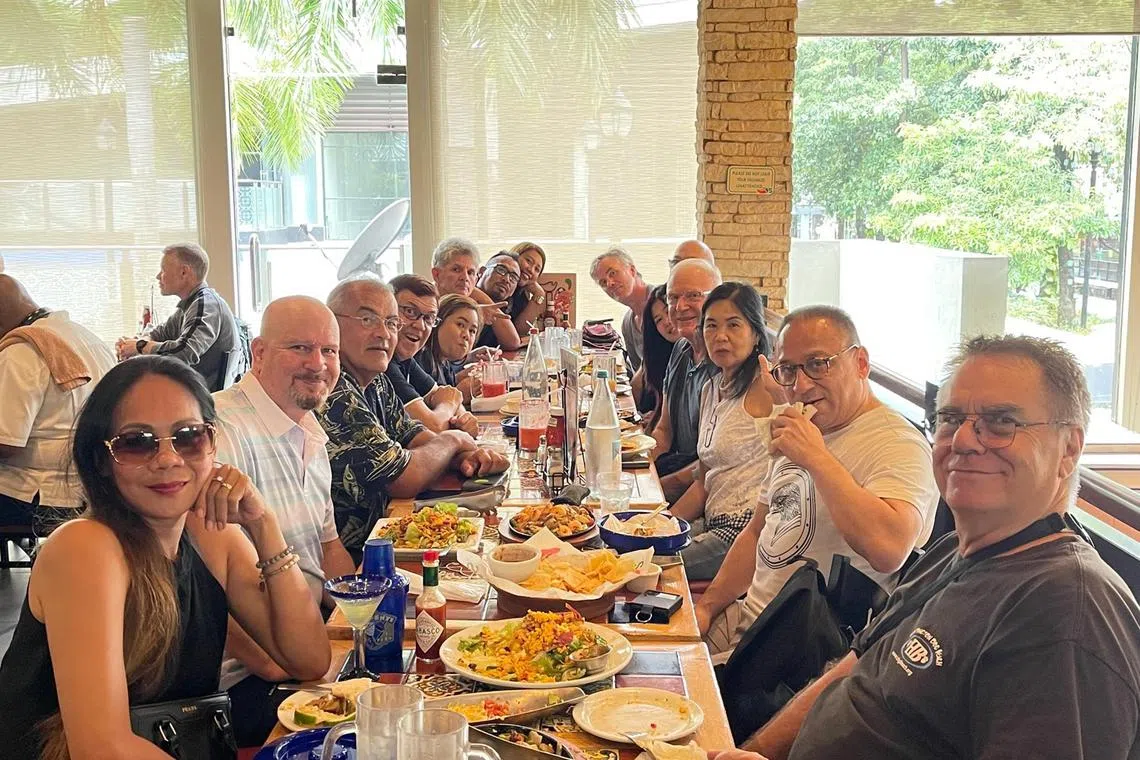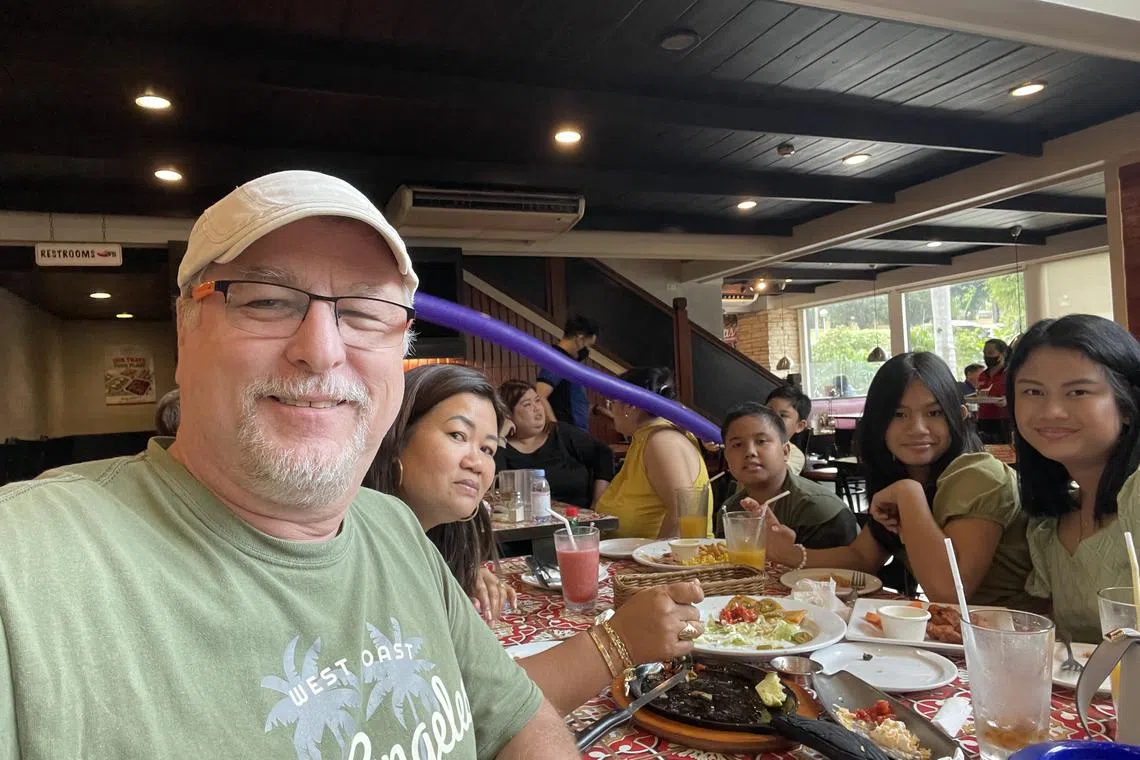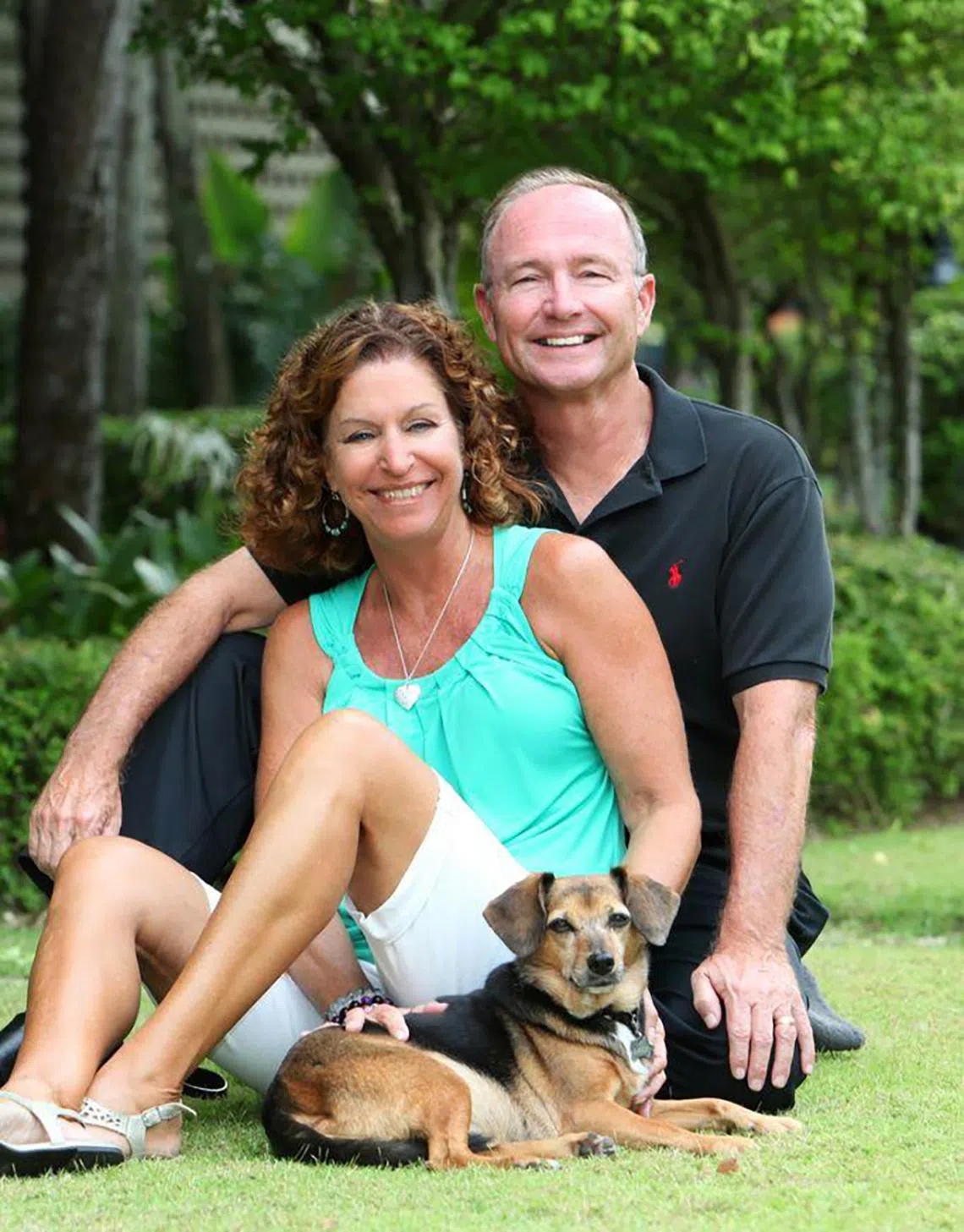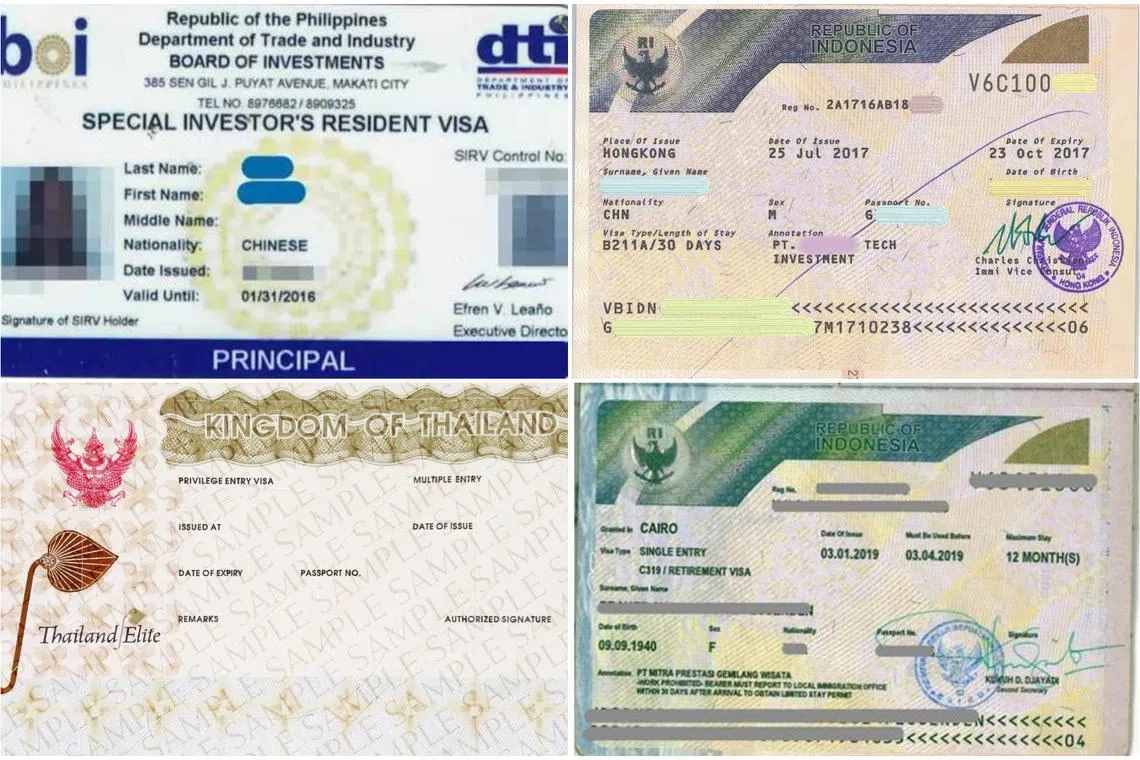Asian Insider
‘Live like a king’ as retirees look to South-east Asia
Sea, sun, low cost of living – and special visas – are big pulls
Sign up now: Get insights on Asia's fast-moving developments

Foreign retirees who are part of US national Steven Johnson's expat support group at an American restaurant in the Philippines on Dec 14, 2022.
PHOTO: COURTESY OF STEVEN JOHNSON
Follow topic:
MANILA – American Steven Johnson often sits inside a wooden hut in Cavite, a province south of the capital Manila, as he records videos teaching other expatriates what they need to do to live the rest of their days in warm and sunny Philippines.
Mr Johnson, 59, was a school safety officer in the United States. But since moving to this South-east Asian country five years ago after retiring from his day job, he has become a YouTuber running “The Philippine Info Channel” catering to mostly Westerners hoping to retire in the Philippines.
He also leads a support group of about 150 foreign retirees, some of whom are raising children with their Filipina partners like himself.
“We have a good life here,” Mr Johnson told The Straits Times from his home on top of a breezy hill overlooking lush greenery and a river.
He is one of more than 73,800 holders of the Philippines’ Special Resident Retiree Visa designed to entice foreigners 50 years old and above to call the country their second home.
Other South-east Asian nations offer similar visas or temporary stay permits that allow foreign retirees to live, work or study there for a certain period and enjoy perks like multiple entry privileges, health insurance and tax exemptions.
Ms Marie Luxa, 56, a former banker from Australia, retired in the island of Penang in Malaysia in 2016. She was attracted to how the country is predominantly English-speaking, its low cost of living and its infrastructure, including access to good hospitals and supermarkets.
The clincher was access to the long-term Malaysia My Second Home (MM2H) visa. This was introduced in 2002 by the Malaysian government as a way for non-Malaysians to retire and live in Malaysia, renewable after 10 years. A review in 2021 tightened the requirements for new applicants.
In 2020, there were 127,200 foreigners living in Penang, while the state’s population stood at 1.74 million, according to the Statistics Department.
South-east Asia has long been a hot spot for thousands of foreigners looking for a new place to live or work that comes with tropical weather, rich culture, cheap commodities and housing, and proximity to nature and wildlife.
They often live in or near capital cities for easy access to business districts or in top tourist spots like Bali in Indonesia and Boracay in the Philippines that are renowned for their white-sand beaches.
Mr Johnson’s monthly pension of about US$3,000 is more than enough to get by in a city where renting three adjacent one-bedroom apartments for his 45-year-old girlfriend, her daughter who is going to college and their two adopted children costs him only around US$190 a month.
This is about 10 times cheaper than renting one apartment in his home town of Lawrence, Massachusetts.
“If you’re making US$1,500 a month, that’s enough to survive here. But back in the US, that will be your rent – and you’d be broke,” said Mr Johnson. “Over here, you’re rich; you can live like a king.”

American retiree Steven Johnson with his 45-year-old girlfriend and the children they are raising together.
PHOTO: COURTESY OF STEVEN JOHNSON
Apart from retirees, South-east Asia is also attracting a rising number of digital nomads and rich professionals who have cash to spend and are looking for a change of scenery. special visas for digital nomads.
Though numbers are not readily available, policy analyst Kate Hooper of the Migration Policy Institute noted that the Covid-19 pandemic accelerated this trend in 2020, as lockdowns and border closures ushered in a new era of remote work.
It is the allure of getting to sip pina coladas by the beach while earning in currencies with high purchasing power, which these foreigners can then spend in a country with a lower cost of living, that is driving this global trend.
Governments in the region, particularly Malaysia, Indonesia and Thailand, are capitalising on this trend by offering
Ms Hooper said governments see these special visas as a way to cushion the pandemic’s impact on local tourism industries. They attract potential long-term visitors who can generate income for local communities that were otherwise dependent upon the seasonal arrival of tourists.
She added that these programmes allow governments to not only market South-east Asia as a digital nomad haven, but also help address some grey areas involving these foreigners.
Many digital nomads still enter the region using short-term tourist visas that are unclear on whether remote work is allowed or not. Before their visa expires, some of them would just go overseas for a few days then return to restart the clock on their tourist visa, a practice commonly known as a visa run or a border run.
“They’re operating in a little bit of a legal grey area… And so digital nomad programmes offer a solution for this. They clarify some of the messy tax rules as well,” said Ms Hooper.
Golden visas targeting affluent foreign investors are also becoming more available in the region. Foreigners who agree to invest a hefty sum in these South-east Asian countries are rewarded with visas valid for decades and additional benefits like spa and golf packages.
Talent Corp Malaysia Group chief executive Thomas Matthew said expatriates help boost the economy by expanding foreign direct investments, generating jobs for Malaysians while also developing their local talent pool.
It is a similar strategy in Singapore, as it woos top talent across the world through the Overseas Networks and Expertise Pass and the Global Investor Programme.
“The objective is to attract investments and grow enterprises in Singapore with a competitive workforce, so as to create more opportunities for locals,” said Associate Professor Terence Ho of the National University of Singapore’s Lee Kuan Yew School of Public Policy.
Philippine Retirement Authority general manager Bienvenido Chy said retirees benefit local communities too, as they often employ an average of four Filipinos to help with household chores, and occasionally engage in charity work.
Mr Johnson uses his earnings from his YouTube channel to give out sacks of rice to his neighbours and help support about 30 children with special needs every month.
Ms Patti Jackson, a 64-year-old US citizen who retired to Penang six years ago, is conscious of how she can help her new home.

Ms Patti Jackson with her husband Bob and their dog Mandy in Penang.
PHOTO: JAMES BOOTH
She spends her money at small local businesses rather than large foreign chains. “My husband and I would rather help a local business, especially as they struggled during the Covid-19 pandemic and are doing the best they can to survive,” she told The Straits Times.
Flip side to the trend
But there are drawbacks to the influx of these foreigners.
While most of them come to South-east Asia for the low cost of living, they ironically drive up the prices of resort bookings, local housing and even restaurant food in key tourist destinations.
Sex tourism remains a scourge in parts of South-east Asia, putting women and young girls at risk. Mr Johnson would usually advise his viewers against engaging in the so-called “sexpat” industry, a play on the words expatriate and sex.
In Thailand, a so-called “foreign mafia” on the resort island of Phuket was accused in February 2023 of taking jobs in industries set aside for locals while using visas that do not allow them to work.
A month prior, Chinese businessman Chaiyanat Kornchayanant and 40 other suspects, mostly Chinese nationals, were charged with drug trafficking and money laundering by a Bangkok court.
In Bali, the sudden influx of Russians and Ukrainians owing to the Russia-Ukraine war
These concerns challenge governments in the region to tighten security checks and ensure programmes crafted for foreigners are not detrimental to locals’ welfare.
Ms Hooper said these special visa programmes would also succeed in the long term if the authorities continue to improve domestic conditions, like faster Internet services and less red tape in application processes.
She said the authorities should also think of programmes that allow foreigners to meet and engage with locals.
Though there are complaints here and there, South-east Asians in general have welcomed foreign retirees, digital nomads and investors with open arms.
Mr Champ Lui-Pio, frontman of popular Filipino band Hale and owner of Alpas Hostel in Siargao island in the Philippines, said these foreigners often frequent his establishment.
“We very much welcome them in Siargao. Having diversity with different backgrounds and expertise help drive economic growth on the island, thus accelerating development, which is crucial coming from two years of lockdown,” he said.
Penang resident Tan Khuay Sim, 70, has observed how foreign retirees go out of their way to help people with disabilities and be part of mainstream society. They have also helped those whose lives were disrupted by the pandemic.
“They assimilate to the lifestyles, cultures and the events happening in Penang. We can see they are careful and show respect when mingling with the locals,” said Mr Tan, a retiree.
“They are knowledgeable and well aware of the do’s and dont’s to make Penang and Malaysia their second home, more than some locals claim to know.”
Some of the expats like Mr Johnson in the Philippines found not just an ideal retirement place, but also a new home they share with people they now consider as family.
“You can really enjoy this place and make a lot of friends,” Mr Johnson said in one of his channel’s most viewed videos. “It’s so good to retire here.”
With reporting by Jeffrey Hutton, Zunaira Saieed, Tan Tam Mei, Tan Hui Yee and Tay Hong Yi
Tickets to paradise
Singapore
Overseas Networks and Expertise Pass
Who is eligible?
Those with a monthly gross salary of $30,000 and above from one employer. Applicants with no recent employment history in Singapore need to show they have worked, or will be working, for an established company with a market capitalisation of at least US$500 million (S$671 million) or an annual revenue of US$200 million. Those deemed to hold outstanding achievements in arts and culture, sports, and research and academia can qualify even if they do not meet the salary criterion.
Work Holiday Programme
Who is eligible?
Undergraduates or graduates aged 18 to 25 from Australia, France, Germany, Hong Kong, Japan, the Netherlands, New Zealand, Switzerland, the United Kingdom and the United States. It has a capacity of 2,000 places at any one time.
Perks
Highly accomplished investors may apply for permanent residency under the programme. A permanent resident above 21 with at least two years of permanent residence may also apply for Singapore citizenship.
Global Investor Programme
Who is eligible?
Three investment options to qualify: Invest a minimum of $10 million in a new or existing business entity in Singapore, invest a minimum of $25 million in approved funds, or establish a Singapore-based single family office with assets under management of at least $200 million.
Perks
Highly accomplished investors may apply for permanent residency under the programme. A permanent resident above 21 with at least two years of permanent residence may also apply for Singapore citizenship.
Malaysia
Malaysia My Second Home
Who is eligible?
Foreign retirees and professionals at least 35 years old with a monthly income of at least RM40,000 (S$12,000), proof of liquid assets worth RM1.5 million and a RM1 million fixed deposit in Malaysia. They must stay in Malaysia for a cumulative period of 90 days a year.
Perks
10-year visa validity that can be renewed as long as requirements are met; multiple entry privileges; allowed to purchase residential home or property and receive offshore income; can own and run a company in Malaysia; tax exemption on pensions.
Premium Visa Programme
Who is eligible?
Applicants must have a local fixed deposit of RM1 million; have a monthly income of at least RM40,000; provide a Letter of Good Conduct from the authorities of the country where they are currently residing; and a medical report from a Malaysian hospital or proof of medical insurance coverage.
Perks
Long-term stay for 20 years, with an option to extend for another 20 years; eligible to conduct business, seek employment and study in Malaysia; no age requirement; no need to provide proof of liquid assets; no minimum stay requirement.
DE Rantau Nomad Pass
Who is eligible?
Local or foreign applicants must be able to present a project or employment contract valid for at least three months and have an annual income of at least US$24,000.
Perks
Live and work in Malaysia for up to 12 months, with option for renewal for up to 12 more months.
Thailand
Thailand Privilege Card (launched October 2023)
Who is eligible?
High-earning businessmen, foreign investors and travellers.
Perks
Depending on the tier, five- to 20-year residency with multiple-entry privileges, immigration services, shopping and leisure incentives.
Non-Immigrant ‘O-A’ Visa
Who is eligible?
Foreigners aged 50 and above who can show that they have a deposit worth at least 800,000 baht (S$31,400) in Thai banks, or a monthly income of not less than 65,000 baht.
Perks
Visa holders can stay for a year but they cannot work in Thailand.
Non-Immigrant ‘O-X’ Visa
Who is eligible?
Foreign nationals aged 50 or over from Australia, Canada, Denmark, Finland, France, Germany, Italy, Japan, the Netherlands, Norway, Sweden, Switzerland, the United Kingdom and the United States who have deposited at least 3 million baht in a Thai bank, or a deposit of 1.8 million baht and an income of not less than 1.2 million baht per year.
Perks
Visa validity up to 10 years with multiple-entry privileges but no work permit.v
Long-Term Resident Visa
Who is eligible?
Highly skilled professionals, wealthy individuals and retirees with a minimum annual income of US$80,000.
Perks
Visa validity up to 10 years with multiple-entry privileges; permission to work in Thailand; 17 per cent personal income tax for highly skilled professionals.

(Clockwise from left) Philippines Special Investor’s Resident Visa, Indonesia Single-Entry Visitor Visa, Retirement Visa for Indonesia and Thailand Elite Card.
PHOTOS: EASYGOPH, WIKIMEDIA COMMONS, MPGBALI, THAILANDELITE
Indonesia
Single-Entry Visitor Visa (B211A)
Who is eligible?
A single-journey visa for those wishing to work remotely from Indonesia. Applicants must present proof of means for living expenses worth at least US$2,000, a return ticket or ticket to a third country. No dependants are allowed.
Perks
60-day validity; extendable twice by 60 days for a total of 180 days.
Second Home Visa
Who is eligible?
Foreign nationals who are able to deposit at least 2 billion rupiah (S$175,000) in an Indonesian bank which cannot be withdrawn while the visa is active.
Perks
Validity can be extended; visa holders allowed to travel, work and make investments in Indonesia.
Retirement Visa or temporary stay permit
Who is eligible?
A temporary stay permit for retired foreigners or those at least 55 years old. Applicants must have, among other things, a pension worth at least US$18,000 a year, and proof of accommodation during stay. Applicants must also hire at least two Indonesian citizens.
Perks
One-year visa validity, extendable for not more than five times consecutively, after which the visa holder becomes eligible for permanent residency in Indonesia.
The Philippines
Special Resident Retiree’s Visa (SRRV)
Who is eligible?
Foreign nationals or former Filipino citizens aged 50 and above who want to retire in the Philippines. Applicants must have a monthly pension of between US$800 and US$1,500, and make a visa deposit of between US$10,000 and US$50,000.
Perks
Indefinite stay with multiple-entry privileges; eligible to work or study in the Philippines; benefits from state health insurer.
Special Investor’s Resident Visa
Who is eligible?
Foreign nationals aged 21 or older who can invest at least US$75,000 in an existing or new publicly listed corporation in the Philippines.
Perks
Same as SRRV.
Sources: Philippine Retirement Authority, Bureau Of Immigration Philippines, Indonesia Directorate General Of Immigration, Bali.Com, Malaysia Premium Visa Programme, Immigration Department Of Malaysia, Ministry Of Foreign Affairs Of The Kingdom Of Thailand, Thailand Board Of Investment, Singapore Economic Development Board, Singapore Ministry Of Manpower, Malaysia Digital Economy Corporation, Thailandelitevisas.Com, Aseanbriefing.Com


